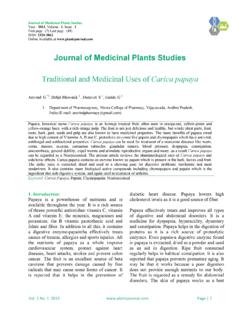Transcription of My Westie is Itchy…what should I do… and not do
1 My Westie is should I and not do!!!!!!!!!!!!!!!! You are probably reading this because you are at your wits end with your itchy Westie . You have been to a number of Vets with little if any improvements and it has been expensive and your darling Westie suffer is a terrible thing. We have been asked by many folks to make a step by step document of Westies in Need itchy skin protocol-so here is LONG and there is lots of please read it carefully and let us know if you have any in Need has had some incredible know Westie skin! I think we should start by saying that your Vet will most probably NOT agree with some of our Vets are wonderful and very open to new are not! However, you have been to a number of Vet appointments and spent hundreds (if not thousands) of dollars and yet here you are still searching for a solution to your itchy Westie , have to begin to ask yourself (and your Vet!)
2 !!!) How has that been working for you????? I guess that we should also begin by making our lawyer happy and say While every endeavor is made to provide reliable, useful advice not every dog is the same and neither food nor medical treatments can be said to apply in every case. You should use this information as a RESOURCE to guide your own research and to help you in discussions with your Vet. that is out of the s Blood Work: you will need to make sure your Vet has done full blood chemistry on your Westie -we will need to have a starting benchmark to begin with. Some Vets call this a Wellness Panel , other Vets have other you need to find out organ function, electrolytes, hematology, proteins etc. It is VERY important to make sure that you include a thyroid test as well (more thyroid info will follow) but you need to have that included.
3 You MUST insist that you see and have a copy of all tests done on your Vet saying I did the blood work and it is all normal is not good enough. You have now made the decision to be an ACTIVE participant in your Westies health and that begins with the results. Blood work can be expensive but very worth it. Thyroid: The thyroid gland uses the measured release of thyroid hormone to regulate the speed of many bodily processes. Thyroid problems occur when the rate of this release is disturbed. The most common thyroid issue in dogs is a decrease in the production and release of thyroid hormone known as hypothyroidism. Many, many itchy Westies have hypothyroidism. When you see the results that your Vet will show and give you for your dogs thyroid function from the above blood test, you will probably see (if they use IDEXX labs) a normal range of about 15-51.
4 So if your Westie s thyroid function is your Vet may say that the thyroid is normal. IT IS our breed and for a dog with skin issues, we want to see the thyroid level in the 40%-50% if your Westie is not showing a thyroid function of about 30, they MUST go on a medication called Thyroxin. You will never completely get your Westie s skin well if the thyroid is not functioning well. Yeast: Far too often when Westies are diagnosed with allergies, they are in fact really suffering from a systemic yeast infection, be it on the surface of the skin or the whole system. If this is the case, antibiotics and steroids will not clear up the source of the problem. They only address secondary bacterial infections and provide temporary relief from itching. Yeast problems can be caused by different yeast organisms. One is Malassezia pachydermatitis, which is a common yeast organism found on normal and abnormal canine skin and ears.
5 Other yeast problems involve Candida Albicans, which can be systemic and the root cause of the problem. Yeast found in the body changes to its fungal form and starts to overgrow in the gut, causing toxins to leak into the body and causing a breakdown in the body's defenses (immune system). The result is that we start to see a reaction (such as a skin, coat, ears) and the reaction is in the whole body's system (systemic). If you understand that the skin is the biggest filter organ in the body, you can understand that this is where the junk and toxins in the body end up, causing the issues you see in your Westie . Our yeasty Westies (they smell like popcorn or a corn chip kinda smell) all go on a 30 day course of Ketoconazole. Ketoconazole belongs to a general class of drugs known as antifungal drugs and inhibits the growth of fungal organisms by interfering with the formation of the fungal cell wall.
6 Please take a VERY careful look at what you are feeding your Westie ---a low glysemic diet is t feed the yeast!!! Yeast needs sugars to please try to eliminate or greatly reduce in both foods and treats: potatoes sweet potatoes carrots tapioca black strap molasses Bacteria: All of our itchy Westies have some level of Pyoderma. Pyoderma refers to a bacterial infection of the skin. From our experience, the tried and true antibiotics that vets use (Cyclosporine, Cephalexin, etc) are good, but we have had better results using an injectable Convenia. It is along-acting antibiotic that exerts its antibacterial effects for approximately 1-2 weeks but stays in the body for over 2 months. This is in contrast to non-repositol antibiotics which are rapidly cleared from the body and need to be administered 1 - 2 times per day. We give our itchy Westies an injection of Convenia on day 1 and again on day 14 of their treatment.
7 Mange: There are 2 types of is Demodectic and one is Sarcoptic. Most dogs are immune to mange; however dogs with compromised immune systems and the elderly are at a higher risk. Your Vet can do a simple skin scraping to make sure your Westie does not have mange---again without that info you can pump all kinds of medications and drugs into them and they will not improve, so you need to rule out mange. Vaccinations: There is a lot of controversy right now over vaccinations (in both people and pets) and the fallout of over vaccinating your Westie can be devastating. In our opinion (and we have to stress here that this is our opinion and you must do your own due diligence with your research!!!) we would suggest that you consider NOT vaccinating your Westie until their skin has been 100% perfect for over a year. We mean no rabies, no DHPP and no heartworm.
8 Afterwards, if you choose to vaccinate your Westie (and yes it is a choice!!!) the most important thing we suggest is to NEVER vaccinate your Westie for anything in the spring, summer or fall months. Their immune systems are at their most vulnerable at those times and skin problems are much more likely to occur. Only vaccinate your dog if there is snow on the ground!!! Also, never vaccinate for rabies and DHPP at the same time-it is very hard on Westies and again not good for their immune system. It is very important to wait at least 2 weeks between rabies and DHPP-they should NEVER be given at the same appointment. Titer-Testing-an alternative to vaccinations: A number of our Westie folks have opted for a titers test each year and not deferring to the automatic vaccination protocol. A titer test (pronounced TIGHT-er) is a laboratory test measuring the existence and level of antibodies to disease in blood.
9 Most experts believe that strong titers are a more reliable indication of immunity than vaccinations: tests show the actual immune not just the attempt to cause an immune response by vaccination. Allergy Testing: In a nut shell, they are not accurate on dogs. We never recommend standard allergy testing and suggest that you spend your money on other treatments. Atopica: (generic name is Cyclosporin) is the medication that many Vets prescribe to Westies with Atopic dermatitis (environmental allergies) Atopica often makes dogs vomit however it may not be the medication itself but the pill casing that does not sit well with them (it is made from castor bean oil that dogs don t process well) Put the Atopica capsule in the freezer and the vomiting will be lessened. If your Westie is still vomiting from the Atopica, consider using the Cyclosporin in a liquid instead!
10 Immune System: When you have a Westie that is itchy , has open sores, is biting at his feet or has chronic ear infections, you have a dog with an immune problem. Even if you cure or control the current problem, you will never completely fix the issue if you do not improve the immune system. Good quality foods, no stress, limit or eliminate all vaccinations will all help to improve immune function. Steroid Use: Hydrocortisone, Vanectyl P (combining trimeprazine and prednisolone) and Prednisone are common drugs that Vets will use to stop a dog from scratching. These steroids should be only used in extreme cases and only for very short periods of time. They are meant to put the fire out to give the Westie some immediate relief but should never be used long term as they can do serious and irreparable damage to organs. Food Allergies: Some Westies may be allergic to foods, but simply being fed these may not be enough in itself to get their immune systems hopped up to the point where itching occurs.









